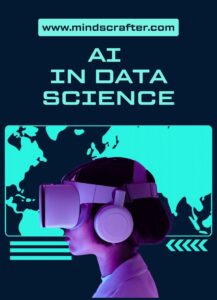
ai in data science
The Future of Data Science: How AI is Revolutionizing Analytics:
Data science has been an essential part of industries for years, enabling businesses to analyze and interpret vast amounts of data to make informed decisions. However, with the introduction of artificial intelligence (AI), data science is evolving rapidly. The future of data science is now, and it’s all about AI. AI has become a game-changer in data science, revolutionizing how businesses analyze and interpret data. From detecting patterns to predicting trends, AI can transform data analysis. With the ability to self-learn, AI has the potential to automate complex tasks, enabling businesses to make decisions faster and more accurately. This article will explore how AI is revolutionizing analytics and the future of data science. So, buckle up and get ready to explore the exciting world of AI and data science!
The Role of AI in Data Science:
AI is revolutionizing data science by enabling businesses to automate complex tasks and quickly gain insights into their data. At its core, AI is all about self-learning. By analyzing vast amounts of data, AI algorithms can learn to recognize patterns and predict future trends.
One of the key benefits of AI in data science is the ability to scale. With AI, businesses can analyze massive amounts of data quickly and accurately, enabling them to make informed decisions faster. AI algorithms can be trained to recognize too complex patterns for humans to detect, giving businesses a competitive advantage.
Another critical role that AI plays in data science is the ability to automate repetitive tasks. Data scientists spend significant time cleaning and preparing data for analysis. AI can automate these tasks, allowing data scientists to focus on more complex tasks.
Benefits of AI in Analytics:
AI is transforming data analytics in numerous ways. The most significant benefit of AI in analytics is the ability to analyze massive amounts of data quickly and accurately. AI algorithms can process and analyze data in seconds, enabling businesses to gain insights into their data faster than ever before.
Another significant benefit of AI in analytics is automating repetitive tasks. Businesses can save time and resources by automating tasks like data cleaning and preparation, enabling them to focus on more complex tasks. AI can also help businesses identify patterns and trends that are too complex for humans to detect, allowing them to make more informed decisions.
Finally, AI is also enabling businesses to personalize their products and services. By analyzing customer data, companies can gain insights into customer behavior, allowing them to create personalized experiences that meet each customer’s unique needs.
AI in Data Science: Current Applications:
AI is already being used in various applications within the field of data science. Predictive modelling is one of the most common applications of AI in data science. Analyzing historical data allows AI algorithms to predict future trends, enabling businesses to make informed decisions.
Another common application of AI in data science is natural language processing (NLP). NLP algorithms can analyze and interpret human language, enabling businesses to gain insights into customer sentiment and preferences.
AI is also being used in image recognition, fraud detection, and recommendation systems. In each of these applications, AI enables businesses to automate complex tasks and quickly gain insights into their data.
The Limitations of AI in Analytics:
Despite its many benefits, AI has its limitations. One of the most significant limitations of AI in analytics is the potential for bias. AI algorithms are only as good as the data they are trained on. If the data is biased, the algorithm will be biased as well.
Another limitation of AI in analytics is the potential for errors. AI algorithms are complex and can be challenging to debug. If an error occurs, it can be challenging to identify the source of the problem.
Finally, AI is not a substitute for human expertise. While AI can automate many tasks, it still requires human oversight to ensure that the insights gained are accurate and relevant.
Future Trends in Artificial Intelligence and Data Science:
The future of AI and data science is bright, with many exciting developments on the horizon. One of the most significant trends in Artificial Intelligence and data science is the rise of explainable AI. Explainable AI is all about making AI more transparent and understandable to humans. By enabling humans to understand how AI algorithms make decisions, businesses can ensure that the insights gained are accurate and relevant.
Another significant trend in Artificial Intelligence and data science is the rise of edge computing. Edge computing involves processing data locally rather than in the cloud. By processing data locally, businesses can reduce latency and improve the speed and accuracy of data analysis.
Finally, the combination of AI and blockchain is also an exciting trend in the field of data science. Blockchain technology enables the creation of secure, transparent, and tamper-proof data records. When combined with Artificial Intelligence, blockchain can help businesses to gain insights into their data while maintaining the security and integrity of the data.
Preparing for the Future of Data Science: The Importance of Learning AI:
As AI becomes more prevalent, it’s essential for businesses to prepare for the future of data science. One of the most critical steps businesses can take is investing in Artificial Intelligence learning. By learning AI, businesses can gain a competitive advantage, enabling them to automate complex tasks and quickly gain insights into their data.
Another critical step businesses can take is to ensure that their data is high quality. AI algorithms are only as good as the data they are trained on. If the data is high quality, the insights gained will be accurate.
Finally, businesses must also ensure they have the proper infraction support AI. Artificial Intelligence requires significant computing power and storage, and businesses must ensure they have the necessary resources to support AI applications.
The Ethics of Artificial Intelligence in Data Science:
As AI becomes more prevalent, it’s essential to consider the ethics of using Artificial Intelligence in data science. One of the most significant ethical concerns is the potential for bias in AI algorithms. If an algorithm is biased, it can lead to unfair outcomes, which can have significant social and economic consequences.
Another ethical concern is the potential for AI to replace human workers. While AI can automate many tasks, ensuring that humans are included is essential. Businesses must ensure they create jobs that leverage humans’ unique skills and abilities.
Finally, it’s essential to ensure that AI is being used to benefit society as a whole. AI has the potential to transform industries and improve people’s lives, but it’s vital to ensure that it’s being used in a way that is ethical and responsible.
Conclusion:
The future of data science is all about AI. AI is revolutionizing how businesses analyze and interpret data, enabling them to make informed decisions quickly and accurately. While AI has limitations and ethical concerns, it’s essential to prepare for the future of data science by investing in learning AI, ensuring high-quality data, and creating the proper infrastructure to support AI applications. With the right approach, businesses can leverage AI to gain a competitive advantage, creating a brighter future for data science and society as a whole.
